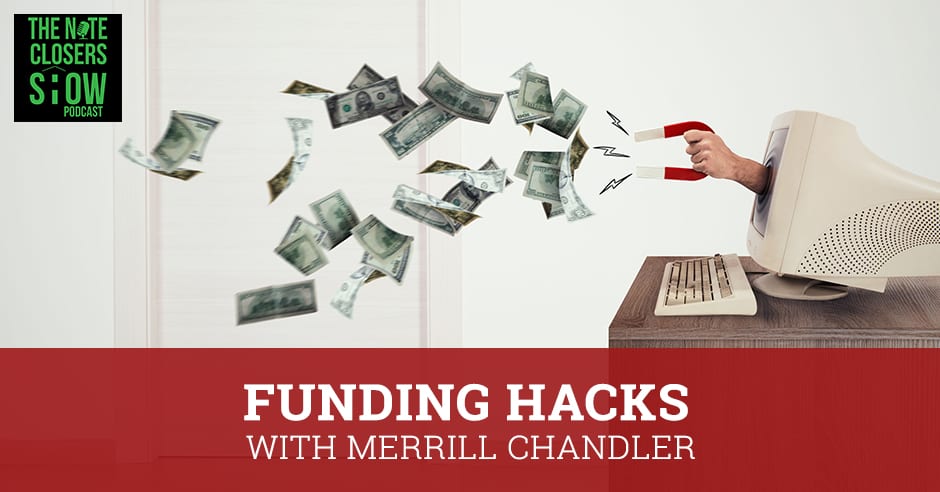
—
Listen to the podcast here
Funding Hacks with Merrill Chandler
We are jacked up. We are all F up with our buddy, Merrill Chandler, joining us.
We’re all kinds of F able.
I love the #FundingHackers.
We have a message. When it comes to real estate entrepreneurial engagements, you can either be fundable or you can be F. There’s no real middle ground. You get approved for your loans, and that could be cars, autos, credit cards on the personal side, business lines of credit and commercial loans on the business side. You’re either getting approved or you’re not. There’s magic on the business to becoming fundable on the business side. That’s our new schwag and that’s been our motto. It also represents the name of my forthcoming book, Are You F Able Or Just F?. Look for that at all of your high boutique note closing podcast.
For those that are hearing from Merrill the first time, what’s your title?
I am the janitor and IT guy, but I happened to have found the greatest fundability enhancement organization ever known to mankind and womankind. I’ve been doing this for 25 years. I co-founded Lexington Law firm, the single largest credit repair law firm in the country. I quickly learned that you couldn’t repair your way to fundability. You can’t repair your way to approvals. I left Lexington to develop this technology. I’ve got a great announcement also. FICO World is being hosted again by FICO. FICO is the measure of all things credit, both personal and in business. We go there to every single event and sit at the feet of the credit and scoring gods and learn all the new tech they’re implementing. We bring that home and give that to our students, our clients, and help them understand what lenders are using to fund their borrowers, and then we make you fundable. We shape you and your business and personal credit profiles so that you can be fundable. Nobody else does this. I invented this tech. I met the CEO and the score development teams of FICO so we could improve our client systems. I love what I do.
That is obvious with your energy every time we’re talking. I’ve known you for a while, Merrill. It’s always a great time visiting with you. Your interview is 150% and not 100%. The company you mentioned is CreditSense.com. You do a great job. A lot of our students are clients, friends of the WCN Nation, our Note Nation clients out there because you’ve done some amazing things out there. Let’s talk about what you are not. Let’s talk about that because there’s a big thing like, “This is a credit repair company.” You’re not a credit repair company. Let’s clarify that and go from there.
I co-founded the single largest credit repair law firm in the country. For credit repair, they do a reasonable job. What is there to do? You write dispute letters to the credit bureaus, and you hope something comes off. That’s why you can’t repair your way to fundability. There’s no such thing. The credit cards they introduce and the credit building strategies they introduce. It’s all inner to their benefit. If they send you to a credit card, that credit card pays them a fee. It’s not beneficial to your credit profile. I don’t mean to break anybody’s heart, but Capital One is not a good credit card to have in your credit portfolio.
When they say, “What’s in your wallet?” I say, “Not your cards.” On the business side, you’ll notice they don’t have any real business cards. It says business credit on their card like Spark or otherwise, but it reports to your profile. It’s not a business card. True business credit stays on the business side. It doesn’t report to your personal. We’re not credit repair and we don’t sell you credit cards that ruin your credit or are poser credit cards. Credit repair is 8% of what we do for those clients who have a few derogatory on their credit report. Most of our clients have good credit. They’re not fundable. No one will give them money, and they don’t know why. We know why. Our collaboration and studying at the feet of FICO has told us why. We can show you how to optimize your personal and business credit profiles so you can get funding of any kind.
There’s more than your payment history. There are about 40 different points that banks look at, and only eight of those 40 points had to deal with your payment history and back stuff. Is that correct, Merrill?
That’s correct. FICO measures 40 characteristics of what are called performance data on your credit profile. People come to me all the time on national real estate conventions or otherwise speaking. They’ll come up and say, “I have an 800 plus credit score.” I go, “Where are your million dollars in business lines of credit?” They’re like, “No one will give me any money.” I’m like, “Doesn’t that sound a little contradictory? 800 credits aren’t creating funding on your business side.” Having good credit keeps you off the bench. You’re in the game, but you’re off the bench. If you’ve got bad credit, you’ve been benched. It’s because you’re on the court doesn’t mean you’re a good player. We need to make you a professional. This isn’t some pickup game at the recreation center. This is professional borrowing. We need to make you a professional borrower so that every time the lenders give you a credit line, every time they give you the ball, you score and you win. They make money, you make money, and you win the championship. The bottom line is 40 characteristics. If you master those on your credit profile, that’s what creates in making you a professional borrower. Paying on time keeps you in the game, but it doesn’t make you good, and it doesn’t make you fundable.
This is my passion. What we do is we make you fundable. That’s the message we gave. When I met with the CEO at FICO, Will Lansing, he asked me what our business model was. I said, “We make borrowers fundable. We optimize the borrower’s credit profile so they could be fundable.” He’s like, “We optimize lenders. Let me have you talk to my score development team.” That’s when we got introduced and we’re going back. Anybody who’s around in November, you’re going to be seeing Facebook Lives after Facebook Lives while we’re there. I am the stupidest person in the room when I go there. No joke. The waiters know more than I do because they are in every single class. I cannot believe that I do not know anything compared to these guys and yet when we bring it home to our clients, we get to convey such unheard things and strategies like you learned in the intensive.
Merrill and I both have been road warriors for the last couple of years, going out and going to different expos, whether it’s the REI Expo or the Think Realty Expo or Distressed Mortgage Expo, NoteWorthy, whatever it might be. You’ve started doing a couple of online workshops for about once a month to an audience of those that are looking to understand this model. It’s also to help them take their fundability levels to a whole greater ballgame. Do you want to talk a little bit about that? You mentioned the intensive. Is that in person? Is that mostly online? Share that with our audience on how you’re helping to educate people out there. It’s not just doing it. You were taking it and breaking it down step-by-step for people.
My model for the last many years is to have a boutique business. I had a few clients; they were high net worth individuals and most of them are real estate investors, note buyers. We optimized for them. We took over their profiles. We optimized them and gave them instructions and did it for them. I kept getting more and more feedback. I can’t afford $25,000, but I want this stuff from people. Friends and family of our clients were like, “Do you have anything I can share with?” There was all this demand. I took my executive team, and we decided that we were going to start getting the tech out there so that people could do this and they could see what long-term fundability means. We still have coaching and we have numerous levels of coaching. We wanted to give people a chance to get their feet wet and even see if this was something interesting to them. There are two phases of it. You can go to FundingHackers.com and sign up for the weekly web class. Every Thursday, we have a web class and if you register for it, it will give you the information you need to be able to get that. It’s 50 minutes to an hour. You go to the web class. They’re live, not recorded. It’s me or my Chief Funding Officer, Brad Burnett. We do these lives so we can do Q&A.
At the web class, you can opt-in for a two-day boot camp intensive. Usually, it’s a Saturday and a Sunday. It’s sixteen hours’ worth of fundability tech. We’re going to be talking one day of personal fundability on your profile. I don’t care what your score is, but that doesn’t make you fundable. Fundability on one day and then business the second day. It costs $97 for the whole weekend because my mission is my full-service clients pay my bill. My mission now is to get this information out to people so they can start seeing what long-term fundability looks like. If interest rates continue to rise, we want the very best rates possible on anything we’re doing either on our personal or business lives. You can go straight to EpicFundingSecrets.com/Bootcamp-Intensive or you can go to FundingHackers.com and that’s how you register for the web class. Either one of them take you into this funnel. There’s no big upsells. This isn’t an excuse to put you in a room. I’m going to bury you in this level of energy. Ask Scott. He attended two times. Tell them, Scott, what do you get? Is this a sales pitch you go to?
It’s not a sales pitch. That’s the whole reason we have you back here every month because I found it valuable. I did a webinar about the necessities of a note investor and even real estate investors and the things you have to do. I talked about you and your EpicFundingSecrets.com/Bootcamp-Intensive. It’s one of the most critical things I’ve learned in the last couple of years. I sat through it. I came to my office, and I went to work for a Saturday or Sunday by being on the computer here. I was blown away by all the different things I learned and some things that were missed that were way wrong and other things. I was like, “That’s different than I thought. That’s a different angle.” It was nugget after nugget. You spent your first day on your stuff. I love the score sheets everybody fills out. That’s an eye-opening experience.
We’ll have you audit your credit profile and find out how fundable you are. It’s an index we built with what we learned from FICO, and we call it the fundability index. You audit your fundability and know what your grade is to see how fundable you are and then what to do about it.
I was also surprised that one of the biggest things you say that script people’s credit is the fact they don’t always match up perfectly with the profiles. Whether their names are off or their dates of birth or whatever. In my case, I had 27 different addresses that showed up from moving so much and buying and flipping and spending time traveling the country and moving around Austin as I moved from fix and flip. That was eye-glaring. It was a full page of addresses on one whole page of my report. I was like, “I understand this now.” That affects it. What does it say when they see somebody who’s got that many addresses?

Funding Hacks: True business credit stays on the business side. It doesn’t report to your personal.
You’re a set of data points. You’re not a person until you go into manual underwriting and you meet with a loan officer and you give them your driver’s license or whatever. You’re a set of data. The data they use is what’s on the credit bureau databases. You don’t know what you’re doing yet. In my instance, before I knew what I was doing, I filed for credit under Merrill Chandler, Merrill Ray Chandler, and Merrill R. Chandler. Those are three different identities and different addresses. I do real estate investing as well, so I have different addresses. All those data points create confidence or a lack of confidence because of the algorithm. How many of you have been approved for a credit card in 30 seconds or two minutes and you got approval? They didn’t talk to a human being and review it. It’s an automatic underwriting. The software is evaluating it. One of the things I learned at FICO is they have what’s called an application score. It measures the difference between what you put on an application versus what the databases have.
There are three databases. Each database has to be identical to what’s on your application for you to get 100% application score, which is what gets you approved. They may approve of you because you have a good profile or good score metric, but they will not give you the highest level. They’ll give you $5,000 or $10,000 instead of $20,000 or $30,000 because your data doesn’t match up and they’re giving you a teaser test to make sure it’s not fraudulent. We cover all that identity stuff on day one of the intensive. Go to FundingHackers.com and register for a web class. It’s free. Start learning this stuff.
If you want to get involved, make that decision later. Listen to what is going on out there because many things are upside down or you’re trained backward. One of the big ones we talked about on the business is that whole Dun & Bradstreet. Dun’s number is important, but you have a Paydex score. That Paydex score is bogus. It hasn’t been used by business lenders for years. FICO has taken over that metric with what’s called FICO liquid credit. It’s a small business scoring service. You don’t even know how they’re measuring. How would you like to play a game where you didn’t know what the scoreboard was measuring? Does it measure the number of times you ran up and down the court? How many times did you take a breath on the court? You have no idea what the scoreboard is measuring. Take the class and get educated. We have stopped being a full-service client relations company and become an education company. People do not know this and we’re changing lives everywhere across the country because you finally get a chance to look at this.
Another thing that stood out was when people have credit cards, you don’t want to be going above 40%.
You don’t want above 40%, but we always tell our clients, “You don’t want your balance to be above 38% because when they tack on interest, that interest is going to take you above.” If you’re at 40%, the interest they talk about at the end of the month and then report to the bureaus will take you over 40% and you end up in the risk department. You do 38% and then when they add on interest, you’re still under 40%. You pass muster and you don’t end up in the risk department or being flagged by your lender as an at-risk account.
As a previous banker, one of the things they teach us as a banker is we’re selling products as a bank. When I worked for JPMorgan Chase, we got paid a flat salary plus commission off of banking. Checking accounts or lines of credit or loans or one of the easiest is they pass $25 for every credit card we got approved or every person who accepted credit card. You shared something knowledgeable like, “When you go into a bank or you get these special offers, you’re instantly approved for the credit card.” Don’t do that. Why is that, Merrill?
Never respond to an offer, especially where you have to put an activation code or a redemption code. The second you do that, you’ll end up on a susceptible borrowers list. Your score goes down when you’re on this list. We’ll teach you how to remove yourself from this list. You are put on a list because if you apply for anything that’s mailed to you, you show that you have credit susceptibility. In the intensive, we call your credit seagull rather than a credit eagle. You’re picking up scraps or anything they send you. You end up on that list, and they don’t take you seriously when you are building more significant lines of credit like on the business side instead of business credit cards and credit lines. You want to make sure in everything you’re doing, never respond to those. If you want that particular credit instrument, go into your branch or call up Chase and say you want to get a credit card. You like the Chase Sapphire, and you want that particular instrument. When you do it online where you didn’t follow a link, you don’t put in an activation code and you don’t end up on that list and downgrading your fundability.
If you did opt into it, that list is being sold off to other lists. You’re getting bombarded with other seagull bait. That’s why people wonder like, “Why am I getting bombarded with these offers?” I’m like, “It’s because you opted into a marketing list that the banks are going to sell out to other banks to make money to send that list.” When I went to college many years ago, they’ve outlawed this across most universities. You sign up for a credit card and get a free t-shirt that says, “College,” across it. The university is getting paid dollar for dollar in every application filled. The money they’re raising was detrimental to a lot of students.
There’s no credit experience. They passed a law that says you have to either prove your means or get parental approval for anybody over eighteen because you can’t get a credit card under eighteen on your own. Until you’re 21, you have to get parental approval or show means.
Don’t accept the offers. If you want something, then go into the actual branch, apply in person or apply on their website without using the opt-in codes.
Go to Chase and look at what they’re offering and pick one of those cards. Do not put in a code. Do not follow a link in mail. Do not respond to those things. Don’t call that 800 number. That 800 number is not the number that would be the customer service number. Here’s another little tip. I always call customer service numbers and say, “Yes, send me over to sales.” In that way, I’m not coming in on anybody’s pitch or any 800 number that I picked up an offer.
How often should people call their credit card companies if they’re paying on time to try to see about getting credit increases?
Usually, they won’t do it more than every six months. Come to the intensive because we’ll talk about Falcon. We’ll talk about the 9,000 bank network that’s monitoring everything you put in your application so they can see if it’s fraudulent or otherwise and how to hack that. That’s why we call it FundingHackers.com. We hack the funding process both personal and on the business. What you want to protect yourself against and what we learned at the intensive is how to create the right profile. It’s not just your identity, but how your profile is going to work along with all 40 of these areas.
We already talked about the fundability index where we measure you and see how well you’re doing, where your successes are as well as where your failures are. Falcon is this 9,000-bank system monitoring how you apply for credit. They’re doing it for legitimate reasons. They’re protecting themselves against the billions of dollars in fraud that go on. The problem is there are some checks they’re going to do, and you need to know how to hack those algorithms. Our whole process is legal, moral and ethical hacking of the bank underwriting systems. There are dozens of these hacks on how to create this awareness for what you’re doing. Don’t get on those lists. It’s how to get off the list if you’re already on it, if you respond to that way.
Let’s take it a little bit different because I don’t want people to think we’re just talking about getting credit card increased and things like that. Your ultimate goal is to work with people, not only to help them improve their stuff and become more fundable in the eyes of banks. You want people to get lines of credit at low interest rates to help them with whatever their passion is. Whether it’s real estate investing or going out and buying more properties with their funds or note investing and being able to have those lines of cards. They can write a check to be able to fund or to use whatever it is to help them in their existing business out there. That’s your ultimate goal.
There are two divisions. There’s personal and business. There are FICO scores for personal and fundability for business. Subscribe to Credit Sense or follow us on Facebook.com/CreditSense because we give these little tips and techniques and show you how people are marketing out there saying, “Let’s get you some business credit lines,” when they’re talking about personal credit cards that you can use for your business, credit cards are not credit lines. There are two things that we do in the intensive. We teach you the difference between a credit card and a credit line and then how to qualify for the credit card and when to use it. Some of you want to write a check to, some you want to run a credit card through. Our flagship product is that million-dollar funding formula. We help borrowers especially entrepreneurs, real estate investors, note buyers acquire $200 million to $500 million in credit lines. We call it the million-dollar funding formula.
This funding formula is all of these bank hacks in a sequential, easy way so that when the lender looks at you, you look spectacular and they want to lend to you. Go back to the basketball metaphor. If every time you get the ball and you shoot and score, are they going to give you the ball more often? I learned that Kareem Abdul-Jabbar still is the all-time highest. We always give the ball to Kareem Abdul-Jabbar because he scored every single time for decades. The lenders, credit lines lenders, business credit cards, and business credit lines are the same way. They will give you more and more money if you know how to shoot and score every time you do it. That’s what the million-dollar funding formula is designed to do. We deliver the million-dollar funding formula in the intensive because I want to educate you.

Funding Hacks: How would you like to play a game where you didn’t know what the scoreboard was measuring?
You’ve got your next class upcoming when?
March 30th and 31st, 2019. It’s Saturday and Sunday. It will be remote. It will be live. When you register, you can register for online or in person. It’s going to be in Salt Lake City in person. We’ve had people come in, and you’ll be in our studio audience because we shoot this in our studio. We have people all the time who fly in and visit with us and take advantage of our presence, but you don’t need our presence. Ask Scott. He didn’t fly out and we’re friends. Everything he got, he got it from his experience being in our online audience.
It starts at 9:00 your time, which is 10:00 Central. You’re until 5:00 PM or 6:00 PM. You got so much stuff done. On Sunday, you wrapped it up a little bit earlier, about 4:00 PM. You gave everyone an opportunity an hour to get some lunch. It’s interactive because you use the Zoom webinar series. We share this a lot to fill questions back and forth. You share it to your private Facebook group so everybody there can ask questions.
We have a private Funding Hackers Club. You don’t get to join unless you’ve gone through the intensive. The Funding Hackers’ Facebook page is all about this interaction. For everybody who’s a member of Funding Hackers, you’ll get one or two t-shirts. We have one that’s a little less on the point. We have a Funding Hackers t-shirt, and one of these t-shirts is for everybody who shares a testimonial of their experience. It’s interactive. We don’t move on until every single question has been asked and answered about every piece of technology that we’re covering.
You provide an intense manual. It has all your slides, so people aren’t looking at the screen trying to take notes. You’ve got it outlined so people can take notes on the slides.
Every slide has its place to take notes. You get the actual worksheets, like what to do to create long-term fundability.
You’re making people do homework like, “Go online, order your credit reports. Order it individually from all three of the credit bureaus so you have those available.” It’s allowing you to score that up to see where you’re at to give you a foundation of starting.
It’s not a pitch. You’ve got to bring the materials that we need to do the analysis and to walk through every piece of your fundability metrics. We have your credit reports directly from the bureaus, which are called consumer disclosure files. We have MyFICO.com which has 28 FICO scores. You audit your FICO report. It’s very easy to understand the process. You can see and bring all that information ready to go to the intensive, so you’re up and ready. We have actionable intel on what to do.
It’s a rocking weekend out there for everybody.
It’s this level of intensity for two days.
If they can’t make it the 30th or the 31st of March 2019, you’re usually doing one the following month. You said the last one is the last weekend.
It will probably be the last weekend of April 2019. We haven’t set the actual date yet, but it will be one of the last two weekends of April. We try and do it the last because many people are going to our web classes on Thursdays and we want to give them an entire month to be able to register and get their homework done and everything before. It’s showing up at the end of the month to do those last weekend-ish of each month.
I know some people who have done well in getting different lines of credit secured, whether it’s $100,000 or $500,000 in a whole variety of different things that you’re helping people do some amazing things out there. Maybe you have a surprise story or two you’d like to share about with somebody who maybe started in the Ds and they worked their ways up to the As.
The principle you’ll learn in this education is what we call the velocity of credit. It means the more time you spend on your profile, the higher the yields are going to be on your business funding. For all business credit, 80% of all approvals come from your credit profile. With those 40 characteristics, they measure what is called your performance data. They measure how you treat other people’s money and then they use that to decide whether or not you get it. It’s not all based on your bid. The amount you get may be based on your revenues or lack of revenues if other things come into play on the business side. 80% of that decision is made on your credit.
We had a woman whose name is Theresa. She’s a note buyer. She was C-minus. She had a decent credit profile, but she wasn’t fundable. She spent numerous months working on her profile. Let’s say you have a $10,000 credit card and then you want to ask for a business line of credit for $50,000 or $100,000 unsecured stated income; it’s not going to happen. The only thing you can prove that you’ve managed is $10,000. She spent time growing those lines and tightening everything up and took the time necessary to optimize her profile. She goes into the bank, and we helped her find the bank. She asked for an unsecured stated income loan or a credit line for her business. It was a consulting firm. They said, “I’m sorry we don’t do stated income.” She’s like, “I thought you did.” We’re like, “Not for your type of business.” They asked for her financial. She had decent financials, so she prepared to put her financials and tax returns. Before she sent that information in, she got a $500,000 unsecured stated income approval.
She called us up. She was excited about having gotten it, but she didn’t understand why they asked for her financials. They didn’t need them to make the decision. I said, “It’s called automatic underwriting.” Automatic underwriting is where you pass muster on all 40 of these characteristics. She had invested the time. She’d had her C-minus on her fundability index and when she went to A-plus range. It had no score. The score isn’t the issue here. I’ll take a 720 score over an 820 score if it’s a fundable profile. Be clear about that. She got approved. She was thrilled and didn’t even have to show her taxes or her financials.
Even though they asked for it, they approved her without it because she hit all of the metrics perfectly and got a $500,000. We’ve had people who get $680,000 in a single, and it’s a property acquisition credit line specifically for real estate investors. We love that lender, but we’d love knowing what the lender needed. We shaped the profile to match it exactly. If you go through the web class, we have dozens and dozens of stories like this of people who started exactly where you are, can’t get the money you want or getting the wrong money or getting seagull money instead of eagle money. Let’s change that. Get an education.

Funding Hacks: The lenders and business credit lines will give you more and more money if you know how to shoot and score every time you do it.
Get the skills, get the knowledge, learn how to implement it. Learn the real rules of everything. Everybody thinks partial rules or they’ve heard things or they watched somebody who’s not an expert to do it.
We’re not getting it from FICO. It’s not like, “My loan officer told me X.” FICO measures your report. I believe FICO. I don’t believe anybody else. FICO scores the quality of your fundability and your profile.
One of the great things I love is we work well in hand with Aaron Young over at Laughlin Associates and helping out people with their entities. Aaron is always talking about like, “Don’t mess up your corporate veil protection. There are things to do that.” That’s one of the strongest points. You’ll be speaking at Aaron’s event in San Diego the 11th, 12th and 13th of April 2019 at the Magnify Your Wealth Summit. You’ve worked with his clients. You’ve worked with the business owners or the entrepreneurs that he’s working with as well. You worked with a lot of our clients. You’re working with us on different things. Business and personal stuff is separate. Having Merrill’s team: Brad, Cheyenne, Jessica and everybody over there that understand the rule, you’re walking into a situation with SEAL Team Six behind you. Your team with Credit Sense is walking in with you to help you. It’s like going to IKEA. If you’re going to IKEA, you want to have the arrow. Here’s how you get through everything. You’re the IKEA of credit optimization and credit weaponization fundability. You’re helping guide hold people’s hands through.
No question goes unanswered in the web class and the intensive itself. We answer every possible question about your situation. You will know what long-term fundability means to you at the end of this. I’d love to have you go to FundingHackers.com, and that’s where you sign up for the web class. If you want to go direct, if you think, “I’m all in. I want to spend $97 for a two-day intensive.” That’s not a pitch. That’s intensive. It’s a fire hose of this kind of tech. Go straight to EpicFundingSecrets.com/Bootcamp-Intensive.
It’s not a sales pitch fest. You’ve only got Brad and Merrill talking. There are no other speakers on it. It’s $97. If at the end of the first day you don’t find the value, it’s like, “If you don’t find value the first day, no problem. We’ll refund back your $97.”
We’ll give you $97 back, and there’s no risk. I’ve never had anybody ask for their money back because it’s fundability at credit and business fire hose time. We’d love to see you at our web class or the intensive. Make sure that you are in. Whatever you do, take the tips. We’ve given many great tips. Never go over 38%. Ask for credit limit increases every six months, but only let them do a hard pull once a year. Ask for a soft pull when you go for a credit line increase. They should give you your increase on a soft pull once per year. Implement the stuff we talked about. If we never see each other again, do the things we’ve talked about. Make sure your identity is one version of your identity across all three bureaus. If you don’t know how to do that, then come to the intensive and you’ll do it with the rest of us. Make it happen, become fundable. You have total control over how much money you get from lenders. Lenders only make money when they lend. They’re looking for a sure thing. If you become the sure thing, they will bury you in money.
About going out and getting new loans on cars, there’s a hack that we won’t disclose here. Most people will buy one, two or three houses a year, but they’ll buy a car or truck every three to five years. The nugget that you shared was awesome. I know some people who are already using it and saving on interest.
That is worth ten times the $97. We do hundreds of hacks, and this one is how to buy a car. This is back office stuff. Nobody knows this stuff because nobody knows how FICO works. The dealers know how to charge you more money. Come to the intensive.
Where are you headed to next? Are you at home for a while in Salt Lake? Are you headed out?
I’m going to be on a few podcasts now that I have this secret sauce. This man is a genius. Read his blog. He told me a nugget that changed my whole capacity to create a presence.
This is all terrain. It helped me in that stuff. That’s a nugget for a different day. Check out the website, CreditSense.com or you can go to FundingHackers.com. Get signed up for the Thursday night live webinar. What time do you host that every Wednesday night?
It’s 5:00 PM Pacific and then 7:00 and 8:00 Central and Eastern.
Is it a different nugget each week or is it the same webinar?
It’s the same. The questions are what veer in different directions. It’s interactive in the last third. The two-thirds are presenting the history and all the things you learn in the intensive itself.
You’ve got the EpicFundingSecrets.com/Bootcamp-Intensive. It’s well worth it. Guys and gals out there, take Merrill upon this opportunity. It’s phenomenal. If you want to start making America great again, make your credit great again. The best time to plant a tree was 30 years ago and then the best time for you to work on your credit would have been a couple of years ago. If you’ve been putting this off or delaying it because you think you’ve got things on your credit that is going to haunt you.
If you have derogatory, we’ll work that out. There’s so much more we can work on FICO of those 40 characteristics. Eight of them deal with derogatory accounts. Ten go with negative, and 30 only do with positive. We can optimize your profile. You can learn what you need to do to optimize your profile even if you have derogatory because 30 other metrics are being measured besides your derogatory accounts. Check out the web class for free, no investment. If you know what you want to do, go to the intensive. Get educated. Find out how you are being held over a barrel and not the good way.
Take action, whether it’s attending the March 30th and 31st intensive or the ones for the end of April. Check out the schedule at CreditSense.com. It’s well worth your time. It’s a very valuable investment in your current and future credit. We’re all going to be around for a while. We’re going to be using our credit to do a variety of things. Why not learn how to do it right and correct it. It helps you versus doing something stupid that penalizes you in the long run.

Funding Hacks: The more time you spend on your personal profile, the higher the yields are going to be on your business funding.
Get $500,000 to $1 million because you can.
Merrill, thank you so much. Thank you so much for taking the time to come out on the show. For those that didn’t know, Credit Sense is one of our sponsors of the show. We’re always honored to have him on because you deliver so much value. Thank you for being a valuable sponsor for what we do as well.
We are believers in Scott Carson and his whole genius over there.
I appreciate it. We’ll see you later.
Important Links
- Merrill Chandler
- Lexington Law
- FICO World
- CreditSense.com
- WCN – WCN Crew Facebook Group
- FundingHackers.com
- Facebook.com/CreditSense – CreditSense Facebook page
- Funding Hackers Club – Funding Hackers Club Facebook page
- MyFICO.com
- Laughlin Associates
- Magnify Your Wealth Summit
- Merrill Chandler
- Think Realty Expo
- Distressed Mortgage Expo
- NoteWorthy
- http://www.EpicFundingSecrets.com/Bootcamp-Intensive
About Merrill Chandler
 Merrill Chandler, the CEO and Chief Strategist at CreditSense.com, has been an influential player in the credit restoration industry for over 21 years and has co-founded numerous successful credit restoration firms around the country, including Lexington Law. Unsatisfied with the results of credit repair alone, Merrill has used his extensive knowledge of credit reporting and credit profiling to single-handedly invent and dominate the credit profile optimization marketplace.
Merrill Chandler, the CEO and Chief Strategist at CreditSense.com, has been an influential player in the credit restoration industry for over 21 years and has co-founded numerous successful credit restoration firms around the country, including Lexington Law. Unsatisfied with the results of credit repair alone, Merrill has used his extensive knowledge of credit reporting and credit profiling to single-handedly invent and dominate the credit profile optimization marketplace.
Since 1997, Merrill and his staff of advisors have assisted real estate investors, business owners, entrepreneurs, and savvy consumers nation-wide to create FUNDABLE Tier 1, and even 800+ credit profiles. Today, CreditSense’s credit profile optimization process has no equal, especially for clients who want to leverage their financial reputations towards wealth and prosperity.
Through superior client relations, Merrill and his team have maintained an A+ Better Business Bureau rating for over 21 years.
Merrill is a compelling and knowledgeable keynote speaker and has addressed real estate investment conferences and businesses forums around the country where he has delivered his popular credit-empowerment forum, “Insider Secrets to an 800+ Credit Score.” Adventurous and passionate, he is an extreme sports enthusiast and enjoys traveling all over the world.

